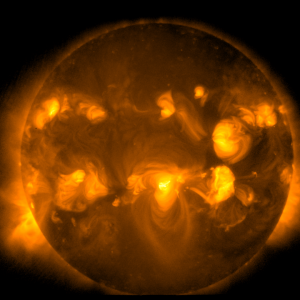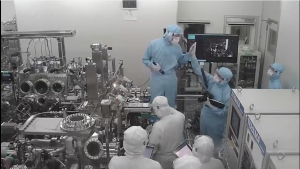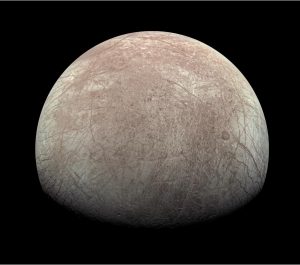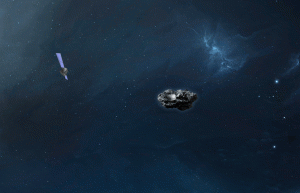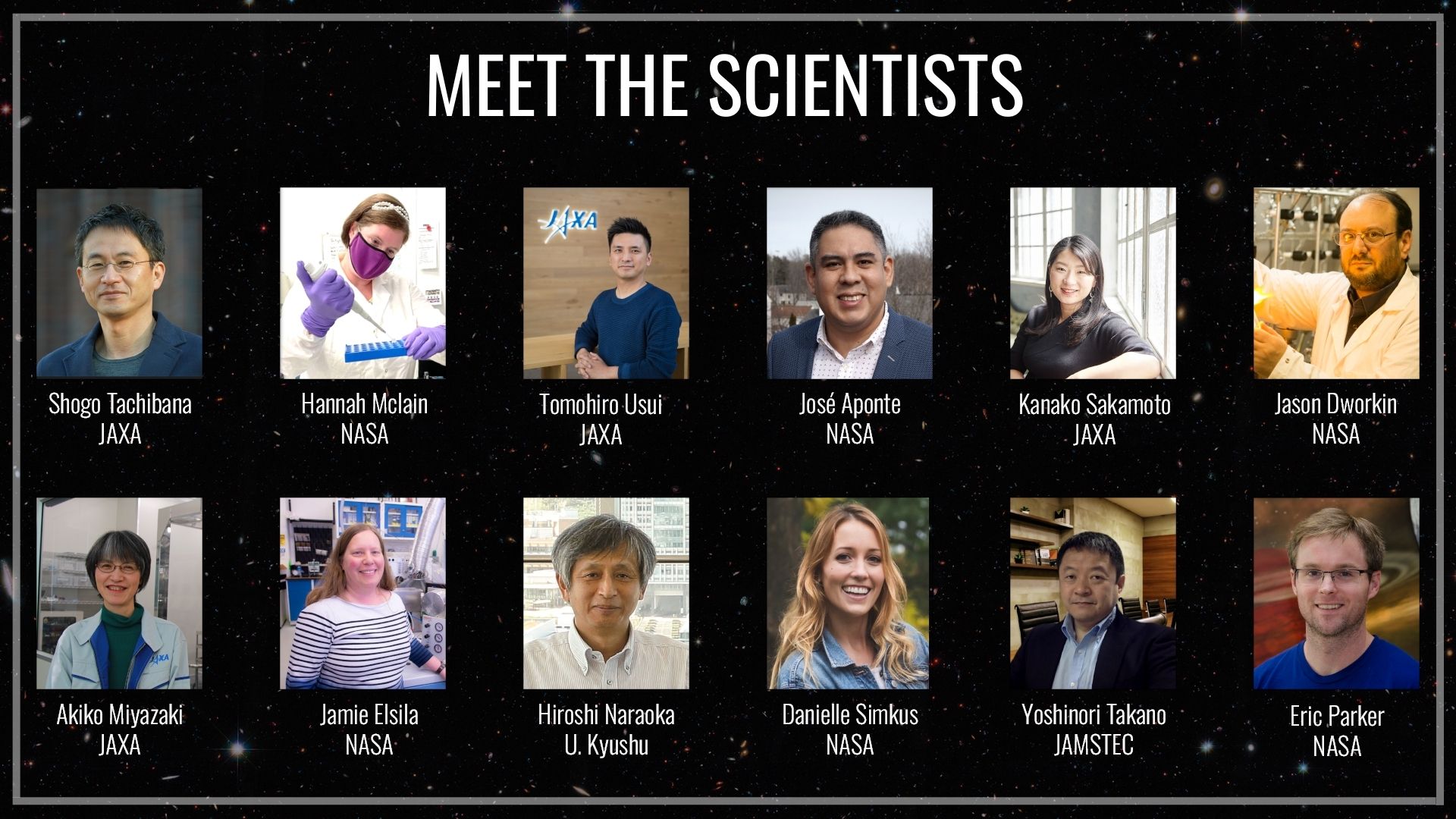
Ryugu & Bennu: Ask us your questions!
Two asteroids. Two countries. Two incredible missions!
The Hayabusa2 and OSIRIS-REx missions visited two different asteroids, Ryugu and Bennu. Hayabusa2 brought a sample from Ryugu home to Earth at the end of 2020, and OSIRIS-REx is scheduled to return material from Bennu in 2023. Scientists from around the world have been involved in both missions, and this week, team members from both NASA and JAXA are excited to answer your questions on what we have learned so far.
To ask a question to our scientists, head over to either the Hayabusa2 twitter accounts (@haya2_jaxa, @haya2e_jaxa) or that for NASA Goddard Space Flight Center (@NASAGoddard), or join us on Instagram or Facebook. Questions are welcome in either English or Japanese until the end of Friday September 9.

Shogo Tachibana, JAXA
Cosmochemist and Hayabusa2 sample acquisition system and sample analysis lead, Co-Investigator on OSIRIS-REx
I am interested in what was responsible for making diverse Solar System planets, including the Earth. A particular focus is understanding the chemical evolution of the early Solar System by combining laboratory experiments, analysis of extraterrestrial materials, astronomical observation, modelling, and Solar System exploration.
I have worked to set the scientific goal of Hayabusa2, develop the sample acquisition system, and lead the sample analysis. I am also a Co-Investigator of NASA’s OSIRIS-REx mission.


Hannah Mclain, NASA
Astrochemist in the Astrobiology Analytical Laboratory (AAL) at NASA Goddard Space Flight Center.
My research involves organic analysis of meteorites, lunar samples, and sample return missions such as OSIRIS-REx and Hayabusa2. The focus of my research is to study the organic complexity of extraterrestrial samples and the pervasiveness of prebiotic molecules necessary for the origins of life.
My favourite parts of working at NASA GSFC are the people that I work with and the precious samples we get to work with. It is always wonderful to be able to touch a sample that was in outer space less than a couple months before we get to analyse it.
Tomohiro Usui, JAXA
Geochemist and leader of the JAXA curation team, team scientist on OSIRIS-REx
I lead the curation team at JAXA’s Institute of Space and Astronautical Science for the Hayabusa2 asteroid Ryugu sample, and I am a Principal Investigator of the Sample Analysis Working Team for JAXA’s Martian Moons eXploration mission (MMX) that will launch to collect a sample from Mars’s moon, Phobos, in FY 2024.
I am also part of the international science team for NASA’s OSIRIS-REx sample return mission to asteroid Bennu, and a member of the Goddard Center for Astrobiology.


José Aponte, NASA
Astrochemist in the Astrobiology Analytical Laboratory at NASA’s Goddard Space Flight Center
I work to develop analytical methods to characterize and quantify small organic compounds that are present in extraterrestrial samples (meteorites, asteroids, the moon, etc.), and that may have been relevant to the origins of life on Earth and possibly elsewhere.
I’m also a scientific Co-Investigator for the NASA Astrobiology Institute at the Goddard Center for Astrobiology and a Collaborator on the science team for the OSIRIS-REx and Hayabusa2 asteroid sample return missions.
Kanako Sakamoto, JAXA
Curation team member at JAXA, coordinating between curation and SMP team and specialising in contamination control.
I am an associate senior researcher at JAXA’s Institute of Space and Astronautical Science, and a curation member for the MMX (Martian Moons eXploration) mission. My particular experience is in the development of the sample acquisition system and contamination control for samples.
I was also part of the Hayabusa2 recovery operation as a member of the Hayabusa2 sampler (SMP) team.


Jason Dworkin, NASA
OSIRIS-REx Project Scientist & Senior Scientist for Astrobiology at NASA’s Goddard Space Flight Center
I study soluble organics from extraterrestrial samples and their analogues to better understand the history of the solar system and the origin of life, and work to maximize the scientific value of samples from Bennu collected by OSIRIS-REx.
Akiko Miyazaki, JAXA
Geochemist and a curator of the Hayabusa2 sample curation team at JAXA.
I works as a curator with the curation team at JAXA’s Institute of Space and Astronautical Science for the Hayabusa2 asteroid Ryugu sample. In particular, I am involved in preparing the sample handling tools (vacuum tweezers), and analysing the Ryugu samples after the opening of the Hayabusa2 sample chambers.


Jamie Elsila, NASA
Acting Deputy Director, Solar System Exploration Division at NASA’s Goddard Space Flight Center & Astrobiologist
I study stable isotopic signatures of extraterrestrial organic compounds, including amino acids in asteroids classified as “carbonaceous chondrites”, Apollo samples, and cometary material returned by the Stardust mission. Asteroid (117657) Jamieelsila is named after me.
Hiroshi Naraoka, U. Kyushu
Organic cosmogeochemist and leader of the Hayabusa2 soluble organics team
I have been studying organic compounds in extraterrestrial materials including the Ryugu samples and carbonaceous meteorites. I also spent 14 months in Antarctica to collect meteorites on the ice sheet.


Danielle Simkus, NASA
Postdoctoral researcher in the Astrobiology Analytical Laboratory at NASA Goddard Space Flight Center.
My research at NASA Goddard is focused on laboratory analyses of prebiotic organic molecules in meteorites and other extraterrestrial samples. My work aims to better understand the abiotic processes involved in the synthesis and preservation of prebiotic organic matter relevant to the origin of life.
Yoshinori Takano, JAMSTEC
Organic cosmo-geochemist, deputy lead on the Hayabusa2 soluble organics team, team scientist on OSIRIS-REx.
I am interested in organic molecular evolution and prebiotic chemistry and I was also a member of the Hayabusa2 sampler team. The returned sample from asteroid Ryugu will tell us about the primordial history and ongoing abiotic processes through the interaction of organic matter, water, and minerals on the carbonaceous asteroid.
I am also a member of team scientist in NASA’s OSIRIS-REx sample return mission and a collaborator of the Goddard Center for Astrobiology.


Eric Parker, NASA
Astrochemist at NASA’s Goddard Space Flight Center.
My areas of interest include astrochemistry, analytical chemistry, and the origins of life. In my research, I apply liquid chromatography- and mass spectrometry-based analytical techniques to analyze complex mixtures for biomolecules considered to be important for life. This includes analyzing extraterrestrial samples (e.g., meteorites and asteroids) and samples resulting from laboratory simulations of abiotic environments. Molecules of interest in these studies include amino acids and peptides.
Further information:
Hayabusa2 mission website
OSIRIS-REx mission website (external site)
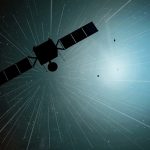 Previous Post
Previous Post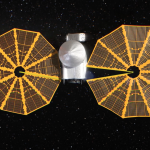 Next Post
Next Post